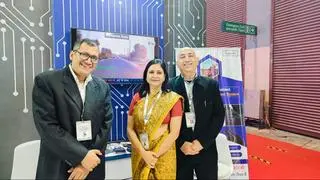Vishal Mehta, co-founder and Partner, Lok Capital, an impact investment venture capital firm, prefers to temper his exuberance about the achievements in financial inclusion and financial technology with the lot that needs to be done in healthcare and education sectors.
The financial services, financial inclusion mandate in the last three-four years has been wonderful, he says. “But I think,” he adds, “we still have a long way to go, and I always want to bring focus back to it, because in all this financial inclusion exuberance it gets lost, we have not proven anything in many of the other impact sectors.”
The deals in sectors such as education, healthcare and agriculture have not been many, “nothing of that level of scale (as financial inclusion), in terms of deal pipeline or exit track record,” he adds. According to him, the innovation in financial inclusion in the last three years is more than what he had seen in the last 15 years. This, says Vishal, is largely due to the overall positive outlook from the government and the regulators, and, specifically due to the approach of the RBI. Financial inclusion just happened to be the entry space to build this whole idea of impact investing, but there are so many other places where the inclusion philosophy and thinking are required, says Vishal, an electronics engineering graduate from the Delhi College of Engineering.
He worked in the telecom sector during the initial years of privatisation, before heading to the US for an MBA from the University of Michigan, Ann Arbor. He worked in the consulting field in the US for a couple of years before co-founding Lok Capital along with Rajiv Lall in 2004.
According to Vishal, Lok Capital’s fund performance so far has been better than expected. It has raised $90 million out of a proposed $100 million third fund, 60 per cent of which has already been committed. Lok Fund II achieved a final close of $64 million in December 2011 and this principal capital has been returned to investors with three years to go in the fund life, according to Lok Capital’s 2017 annual report.
Some exceptions
Part of the problem with the other impact sectors is the investment horizon and scale. What works for financial inclusion will not work in, say, healthcare and education. “Some of the impact sectors will have to think differently from the mainstream,” says Vishal. Investors in funds such as Lok’s also need to be more realistic about their return expectations and timeframe. That rationalisation, says Vishal, is happening. “Now, I am able to have a lot of conversations with these investors and when I say 9-10 per cent (returns), they don’t fall off the chair. That is a good sign, because we need that kind of capital,” he adds.
On a global level, Vishal says the exuberance on the impact sector is obvious. A number of large-size asset managers are thinking of impact investing and newer sectors are getting attention. “Ultimately,you need the risk capital. Innovation will happen only when you have that risk capital. That seems to be evolving.” There is also the realisation that funds need a longer life of, say 10 years, rather than 5-7 years.
Lok itself has started marketing an impact debt fund, for which it hopes to achieve a first close at $50 million by June. There is a huge unmet demand for venture debt in the impact space. “The idea is within the impact space, if you have to diversify, that is another useful product. We are also thinking about some of these fundamental changes to the fund model itself,” says Vishal. It may start looking at a fourth fund towards the end of 2018.








Comments
Comments have to be in English, and in full sentences. They cannot be abusive or personal. Please abide by our community guidelines for posting your comments.
We have migrated to a new commenting platform. If you are already a registered user of TheHindu Businessline and logged in, you may continue to engage with our articles. If you do not have an account please register and login to post comments. Users can access their older comments by logging into their accounts on Vuukle.